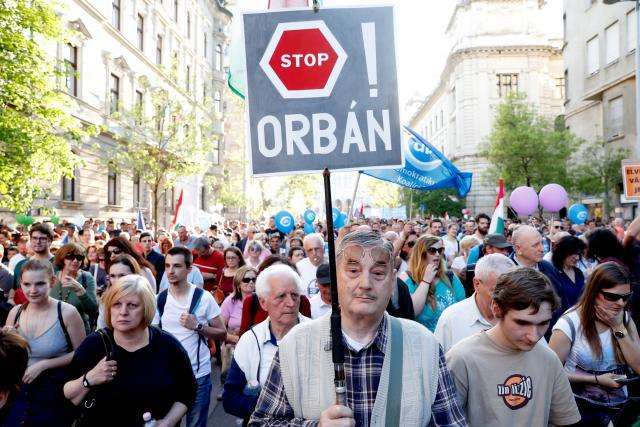The rally in Budapest was the second mass protest against Orban since the April 8 election, with demonstrators urging the fragmented opposition parties to join forces against the rightwing nationalist Fidesz party, which won two-thirds of parliamentary seats at the polls.
Since 2010, the Hungarian premier has increased his control over the media and put allies in charge of formerly independent institutions, while his stand on refusing to accept large numbers of migrants in Hungary has also brought him into conflict with the European Union.
As tens of thousands of protesters waved flags at the foot of Elizabeth Bridge spanning the Danube, speakers called for freedom of the media and a change in government.
Peter Marki-Zay, who beat the Fidesz candidate in a mayoral by-election in February, urged opposition parties on the right and left to build an alliance and put aside their former bickering.
“History has proved that no oppressive regime lasts forever,” he said.
“We shall fight ... against their media dominance and factories of lies.”
“It is fear that holds this system together, and if from tomorrow people no longer have their fears this system will fall.”
In a Facebook post before the rally, organizers said state media has been turned into Orban’s “propaganda machine”.
“Our main goal is to dismantle Fidesz control over the public media ... but opposition parties also have a task as they are also responsible for this situation we are in,” they said.
Protesters gathered at the parliament building and then walked to the bridge, waving national and EU flags. Last Saturday, tens of thousands had protested at parliament against what they see as an unfair election system.
Protesters held banners with slogans such as “Viktor give us back democracy”, “We want freedom of the press” and “Regime change”.
THIRD TERM
“Today is the beginning of a process ... in government, I am sure that the opposition parties would not be able to cooperate. In opposition, I see more chance for that,” said Adam Farkas, 21, a student.
“We disagree on many things ... but we all want to live in Hungary and the main obstacle to that is Viktor Orban.”
Orban won a third straight term in power after a strong anti-immigration campaign. The strongest opposition party in the new parliament is the formerly far-right Jobbik, which has recast its image to be a more moderate nationalist force. Its leader resigned after the election.
The leftist opposition parties are also in turmoil.
“It is not Fidesz which won the election, the opposition parties lost it,” said Viktor Mikes, a 26-year old administrator at a multinational company. He said opposition politicians should all step aside, and that new people were needed.
“We should start with a clean slate,” he said.
The election victory appears to have emboldened Orban to put more effort into his fight against the EU’s migration policies and harden his stance on NGOs that he says have been meddling in Hungary’s affairs.
In an interview on Friday on state radio Orban accused George Soros, the Budapest-born financier, of political activism in Hungary, saying his circle had supported the opposition.
“I know they won’t accept the result of the election, they will organize all sorts of things, they have unlimited financial resources,” Orban said.
The foundation of George Soros on Friday accused Orban of trying to stifle non-government groups, and said it could leave the country if parliament passes a “Stop Soros” law that would impose a 25 percent tax on foreign donations to NGOs that support migration.
The government says the legislation is meant to deter illegal immigration.
More about: #Hungary
















































